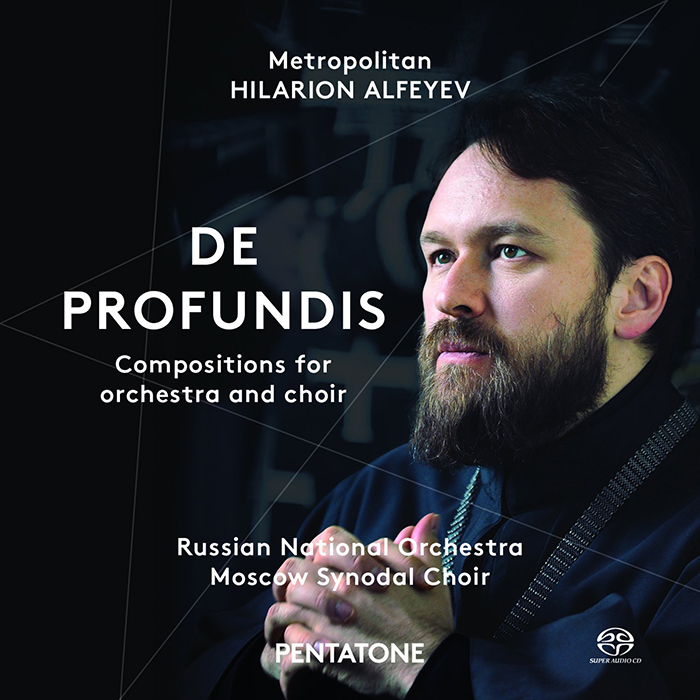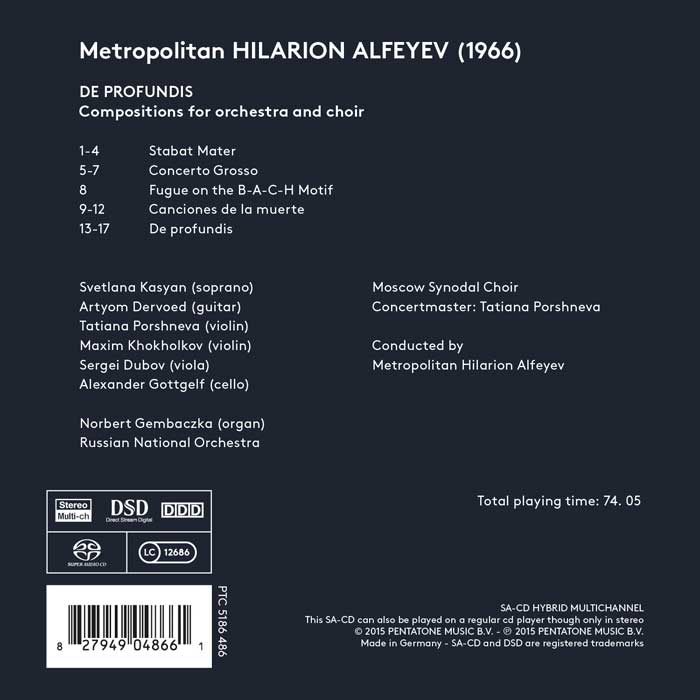Share This
Album at a Glance
Tags
- Alexander Gotgelf
- Alexei Puzakov
- Artyom Dervoed
- choirmaster
- composer
- conductor
- De Profundis
- Maxim Khokholkov
- Metropolitan Hilarion Alfeyev
- Moscow Synodal Choir
- Norbert Gembaczka
- Pentatone
- Russian National Orchestra
- SACD
- Sergei Dubov
- Svetlana Kasyan
- Tatiana Porshneva
- Алексей Пузаков
- Митрополи́т Иларио́н
- Российский национальный оркестр
Related Posts
Metropolitan Hilarion Alfeyev: De Profundis - Compositions for orchestra & choir / Russian Nat’l Orchestra; Moscow Synodal Choir; Alfeyev
Posted by Paul Ballyk on Aug 17, 2015 in Contemporary | 0 comments
Noted theologian, church historian, author and Archbishop, Metropolitan Hilarion Alfeyev is among the most performed Russian composers working today. Born in 1966, Hilarion Alfeyev studied at the Moscow State Conservatory. In 1987, he was ordained a priest, later to become an Archbishop, and in 2010, was elevated to Metropolitan (in the Russian Orthodox Church, a 'Metropolitan' presides over the governing council of Bishops for a given church province or region). This Pentatone Super Audio CD release contains a selection of both sacred music and concert pieces by Hilarion Alfeyev performed by the Russian National Orchestra, the Moscow Synodal Choir and soprano soloist Svetlana Kasyan with Metropolitan Alfeyev on the podium.
Hilarion Alfeyev's best known and most widely performed works are his St. Matthew Passion and the Christmas Oratorio, written in 2006 and 2007, respectively. Five smaller scale pieces make up this program, each composed between 2008 and 2012. There are two liturgical works for chorus and orchestra, Stabat Mater and De profundis. The three remaining are non-liturgical pieces, Canciones de la muerte for soprano and orchestra and two purely orchestral works, Concerto grosso and Fugue on the B-A-C-H Motif.
Although influences of modern musical techniques are evident throughout, what is most striking about Alfeyev's music is its neo-Baroque styling, and how every measure conveys a profound religiosity. He writes in a lyrical, polyphonic style characterized by simplicity and an economy of thematic material. It sounds minimalistic at times, but is not without impressive, dramatic culminations of sound. His orchestration is vibrant and effective. Although the music is insistently evocative of the Baroque, the palette of colors he employs is often foreign to it: prominent solo lines for clarinet, trombone, trumpet, saxophone and tuba, as well as colorful percussive effects of chimes, bass drum, cymbals and gong, betray the composer’s cosmopolitan, 21st-century education.
There are two examples from the album on offer here. First is the opening Adagio molto. Allegro of the Concerto grosso for string orchestra and harpsichord and second is Super Flumina Babylonis for chorus and orchestra from De profundis. Like these selections, all of the music on the album is approachable and easy to enjoy. Top rate performances and the excellent sonics we've come to expect from Pentatone round out a truly original release.
Metropolitan Hilarion Alfeyev is one of the most widely performed of all living Russian composers. Each of his new compositions constitutes a milestone in contemporary musical history. His ability to imbue his music with profound religious content, to unite diverse cultures and styles, to invent new ways of musical expression while remaining faithful to the centuries-old classical tradition, and to utter most profound themes using a simple and comprehensible musical language, singles him out among present day composers.
His most widely performed work, the St Matthew Passion (2006), has received worldwide recognition. Following its premiere in the Grand Hall of the Moscow Conservatory in March 2007, it has been performed more than seventy times in different countries by the most distinguished soloists, choirs and orchestras. Invariably it receives standing ovations from audiences at each concert. This SACD features five works by Metropolitan Hilarion that were produced over a thirty year period and performed by the excellent Russian National Orchestra.
As the first Russian orchestra to ever win a Grammy award, the orchestra demonstrates a superior performance in this recording. As The Moscow Times once positioned it, “RNO played with a power, beauty and finesse currently unmatched by any other Moscow orchestra.”
Source: Pentatone
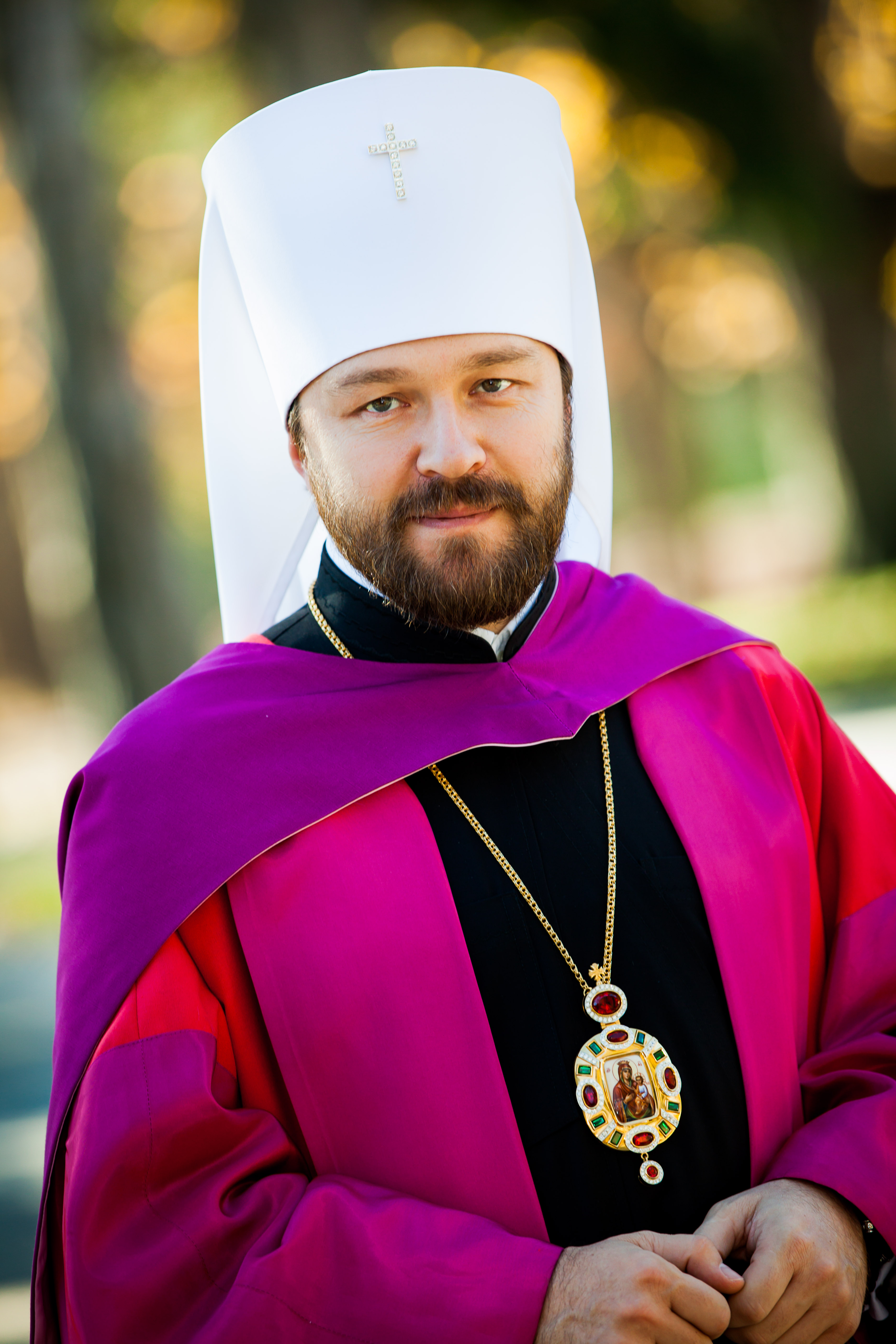 Hilarion Alfeyev |
Metropolitan Hilarion Alfeyev, composer & conductor Hilarion Alfeyev (born Grigoriy Valerievich Alfeyev; 24 July 1966) is a bishop of the Russian Orthodox Church. At present he is the Metropolitan of Volokolamsk, the chairman of the Department of External Church Relations and a permanent member of the Holy Synod of the Patriarchate of Moscow. He is also a noted theologian, church historian and composer and has published books on dogmatic theology, patristics and church history as well as numerous compositions for choir and orchestra. Grigoriy Valerievich Alfeyev was born on 24 July 1966 in Moscow. From 1972 to 1982 he studied violin, piano and composition at the Moscow Gnessins School and from 1983 to 1986 at the Moscow State Conservatoire. From 1984 to 1986 he served in the Soviet military. In January 1987, after serving in the military, he became a monk (see below under Church activity). In 1989 graduated from the Moscow Theological Seminary and in 1991 from the Moscow Theological Academy with the degree of Master of Theology. From 1991 to 1993 he taught homiletics, dogmatic theology, New Testament studies and Byzantine Greek at the Moscow Theological Academy, St Tikhon’s Theological Institute and St John the Theologian’s Orthodox University. From 1993 to 1995 he studied at the University of Oxford (UK) under the supervision of Bishop Kallistos Ware. In 1995 he completed his doctoral thesis on ‘St Symeon the New Theologian and Orthodox Tradition’ and was awarded the degree of Doctor of Philosophy. Alfeyev is author of numerous musical compositions. His St Matthew Passion, grand oratorio for soloists, choir and orchestra, received a standing ovation at its performances at the Great Hall of Moscow Conservatory (27 March 2007), at the Auditorium Conciliazione, Rome (29 March 2007), and at St Patrick’s Cathedral, Melbourne (28 September 2007). Equally well received was his Christmas Oratorio, performed in Washington, Boston and New York (18–20 December 2007) and later in Moscow (7 and 15 January 2008) and his Stabat Mater (world premiere in January 2012 under the direction of Vladimir Spivakov). Source: Wikipedia ______________________________________________________________
|
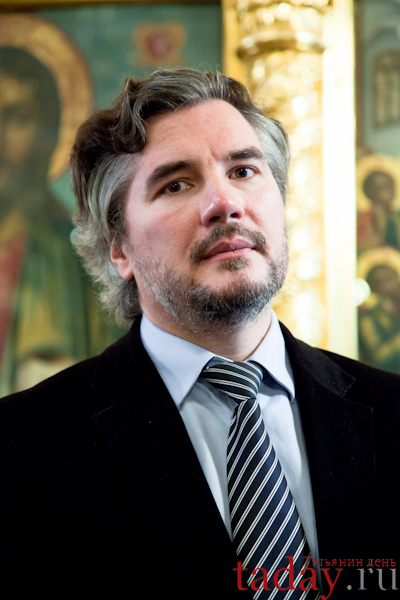 Alexei Puzakov |
Alexei Puzakov, choirmaster Alexey Alexandrovich Puzakov was born in Moscow in May, 1966. At the age of eighteen, he was hired to work as a reader and altar boy in a church; at the age of nineteen, Alexey worked as an assistant to Nikolai Matveyev, the conductor of the choir of the Skorbyashchenskiy Church in Moscow, managing the left choir gallery. A. Puzakov then proceeded to conduct the bishops’ choir of the Vilnius and Lithuanian diocese. During the celebration of the 1,000th anniversary of Christianity in Rus, Puzakov first took part in a concert of sacred music at the Cathedral of the Holy Spirit Monastery in Vilnius. After that, A. Puzakov worked as choirmaster in Moscow churches: the Church of the Resurrection at the Vagankovskiy Cemetery and the Church of St. Nicholas-Kuznetsk. In 1994, Alexey Puzakov, backed by Archpriest Nikolai Sokolov, Father Superior of the Museum Church of St. Nicholas in Tolmachi, and the staff of the Tretyakov Gallery, founded a national church choir in this famous museum, which he managed for almost fifteen years. In 2006, Alexey Puzakov was awarded the title of Honored Artist of Russia. He was also awarded the Order of the Church of St. Sergius of Radonezh and St. Innocent of Moscow. In spring of 2009, Metropolitan Hilarion (Alfeyev) was appointed Father Superior of the Church of the Icon of the Mother of God “Joy of All Who Sorrow”; the Metropolitan greatly encouraged the revival of the Moscow Synodal Choir, once famous throughout all of Russia. Alexey Puzakov was put in charge of this new group, which brought together eighty choristers, and was destined to become the leading professional church choir in Russia. Source: www.mossinodhor.ru ______________________________________________________________
|
|
Russian Nat’l Orchestra |
Russian National Orchestra The Russian National Orchestra premiered in Moscow in 1990. It was the first Russian orchestra to perform at the Apostolic Palace, Vatican and in Israel. The RNO’s first recording (1991) was Tchaikovsky’s Symphony No. 6, Pathétique, released on Virgin Classics. Since then, the orchestra has made over 75 recordings for Deutsche Grammophon, Pentatone, Ondine, Warner Classics and other labels, and with conductors that include RNO Founder and Artistic Director Mikhail Pletnev, Vladimir Jurowski, Kent Nagano, Alexander Vedernikov, Carlo Ponti Jr., José Serebrier and Vasily Petrenko. The RNO’s recording of Prokofiev’s Peter and the Wolf and Beintus’s Wolf Tracks, conducted by Kent Nagano and narrated by Sophia Loren, Bill Clinton and Mikhail Gorbachev, was the winner of a 2004 Grammy Award, making the RNO the first Russian orchestra ever to win this honor. A Spanish-language version narrated by Antonio Banderas was released in 2007, following a Russian version narrated by actors Oleg Tabakov and Sergei Bezrukov, with a Mandarin edition following in 2011. Narrators in concert versions of these works have included actors Danny Glover, Diana Douglas, Sean Dill and Debbie Allen, model Tatiana Sorokko, Singaporean violinist Min Lee, and BBC anchor Seva Novgorodsev. A regular visitor to the Schleswig-Holstein, Gstaad and Rheingau festivals, the RNO is also the founding orchestra of Napa Valley Festival del Sole, Festival of the Arts BOCA in Florida, and the Singapore Sun Festival, and resident orchestra for multiple seasons of the Tuscan Sun Festival in Cortona, Italy. The RNO launched its own annual festival in 2009, held each September in Moscow. In 2008, a panel of international critics assembled by Gramophone named the Russian National Orchestra as one of the world’s top orchestras. The Russian National Orchestra is a private institution supported by individuals, corporations and foundations in Russia and throughout the world. Affiliated organizations include the Russian National Orchestra Trust, the Russian Arts Foundation and the American Council of the RNO. Another RNO innovation is Cultural Allies, an ongoing program encompassing exchanges between artists in Russia and the West, and the commissioning of new works. Source: Wikipedia ______________________________________________________________
|
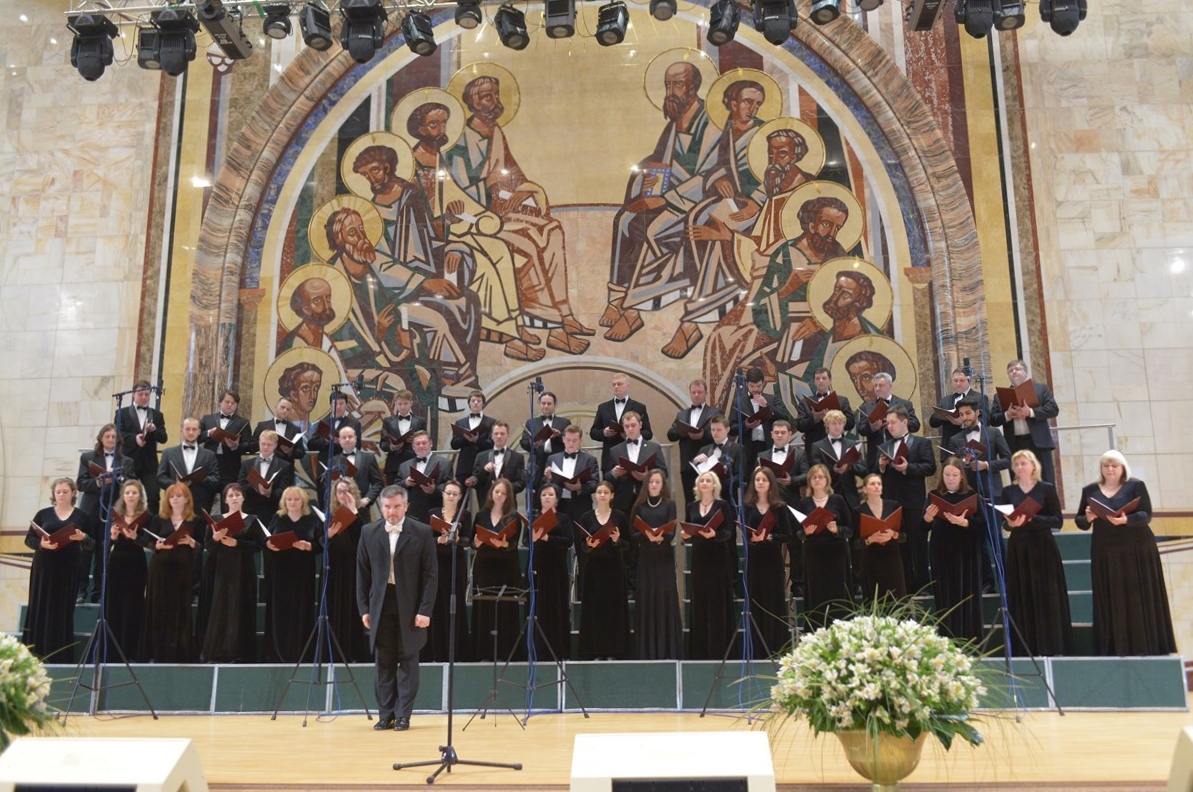 Moscow Synodal Choir |
Moscow Synodal Choir The Moscow Synodal Choir (Московский Синодальный хор), founded 1721, was the choir attached to the Moscow Synodal School prior to its dissolution and merger into the choral faculty of the Moscow Conservatory in 1919. The choir was revived in 1999. The basis of the Synodal Choir was the Russian Patriarchal choir formed in the 16th Century of adult clerics. Following the abolition of the Patriarchate in 1700, the choir became known as the “Cathedral Choir” (соборный хор) attached to the Assumption Cathedral of the Kremlin. Following the establishment of the Holy Synod in 1710, the choir officially became known as the Moscow Synodal Choir. Soon after this boy sopranos and contraltos joined the choir to perform the new polyphonic music. During the 17th and 18th centuries, the Synodal Choir was a rival in terms of skill and performance to the Tsar’s own chorus of clerical singers, the Russian Imperial Chapel Choir, which moved from Moscow to the new capital in St. Petersburg in 1712. Alexander Kastalsky (Александр Дмитриевич Кастальский, 1856–1926) was the last director of the school and choir. In 1887 Kastal’sky began teaching piano at the Synodal School, in 1891 he became assistant precentor of the Synodal choir then in 1910 director. In 1910 the Moscow Synodal Choir celebrated its bicentennial under the conductor Nikolai Danilin (Николай Михайлович Данилин, 1878–1945) conducting the first performance of Rachmaninov’s Liturgy of St. John Chrysostom Op.31. In 1919 the Moscow Synodal School was dissolved and merged into the Moscow Conservatory, the Choir ceased to perform sacred music and the boy sopranos were released, though Kastalsky continued to perform folk music with the choir till 1923. The Moscow Synodal Choir was revived with the blessing of Kirill I, Patriarch of Moscow and all Rus’, under the conductor Aleksei Puzakov (Алексей Пузаков), People’s Artist of Russia, in 2009. Source: Wikipedia
|
![]() About Paul Ballyk
About Paul Ballyk
all about Paul
Twitter •
| Thinking about purchasing this album?
Follow this link for more album details or to make the purchase. Buy it now |
“Not just recommended. Guaranteed.”
We stand behind every album featured on Expedition Audio. Our objective is to take the monetary risk out of music exploration. If you order this album from HBDirect.com and do not like it you can return it for a refund.
Hilarion (Alfeyev) - The Passion According To St. Matthew





